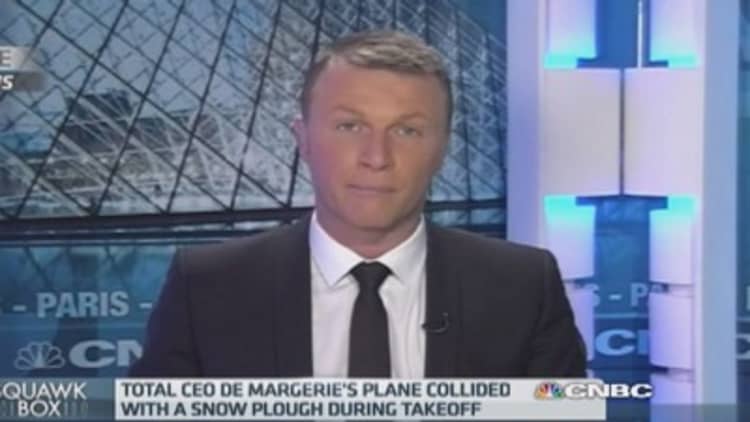
Tributes poured in for Christophe de Margerie after the chief executive of France's Total oil company was killed when his private jet crashed into a snowplow in Moscow. Three other people were killed, and the plow's operator was drunk, investigators said.
The plow operator was not hurt in the crash, which happened late Monday as the plane was taking off from Moscow's Vnukovo airport, authorities said.
"At the current time, it has been established that the driver of the snowplow was in a state of alcoholic intoxication," said Tatyana Morozova, an official with the Investigative Committee, Russia's main investigative agency. She said investigators are questioning the snowplow driver and other witnesses, The Associated Press reported.
French Prime Minister Manuel Valls called the 63-year-old de Margerie a "great captain of industry and a patriot." French president Francois Hollande expressed his "stupor and sadness" at the news. Russian President Vladimir Putin sent condolences.
Born into privilege as a member of the Taittinger Champagne dynasty, de Margerie still had the drive to succeed outside the business. His parents were Pierre Rodocanachi and Colette Taittinger, but he later adopted the name of his stepfather, Pierre-Alain Jacquin de Margerie. De Margerie leaves behind a wife and children.
De Margerie went to Total after completing his degree at the École Supérieure de Commerce in Paris in 1974, and made his name negotiating for assets in the Middle East. He led the company's Middle East division from 1995, and then joined its executive committee as head of exploration and production in 1999.
When Thierry Desmarest, who had turned Total into the world's fourth-largest oil company through a series of deals, moved up to become chairman in 2007, de Margerie seemed the natural successor as chief executive. In 2010, he became chairman of the company, too.
In recent months, there had been speculation that de Margerie might appoint a successor from within the company soon, with Philippe Boisseau, head of its new energies division, and Patrick Pouyanne, head of refining and chemicals at the company, mentioned as potential heirs. However, as his presence in Moscow, where he had met with Prime Minister Dmitry Medvedev according to a report in Russia's Vedomosti newspaper, shows, he was still very much in charge.
Total's board is meeting Tuesday to discuss how to proceed without de Margerie at the helm. Total share prices were higher Tuesday in afternoon trading in Paris.
He was sanguine about dealing with some of the undemocratic regimes in oil-rich countries, including negotiating deals with Saddam Hussein's government in Iraq, and the Myanmar regime. He was charged—and cleared—with misusing assets in France over the United Nations' controversial oil-for-food program with Iraq, in which Total took part.
More recently, he urged Western powers not to build a "new Berlin wall" with Russia over sanctions against Russian businesses and individuals.
Easily recognizable for his distinctive mustache, his genial demeanor hid a sharp intellect and grasp of the problems facing the oil industry. He set an ambitious target for Total of having the capacity to produce 3 billion barrels of oil per day by 2017.
In July, de Margerie told Reuters that he wanted to be judged by the number of new projects he had launched, including African fields like Angola's CLOV and Nigeria's Egina, not on places where Total was already producing when he took charge, many of which have been affected by political tensions.
He also recently became the first chief executive of an oil major to challenge the petrodollar, when he said "There is no reason to pay for oil in dollars."





